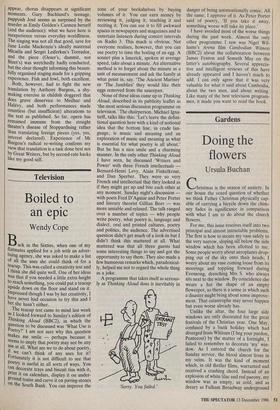Television
Boiled to an epic
Wendy Cope
Back in the Sixties, when one of my flatmates applied for a job with an adver- tising agency, she was asked to make a list of all the uses she could . think of for a teacup. This was called a creativity test and I think she did quite well. One of her ideas was that if you needed a little extra height to reach something, you could put a teacup upside down on the floor and stand on it. Impressed though I was by her creativity, I have never had, occasion to try this and I bet she hasn't either.
The teacup test came to mind last week as I looked forward to Sunday's edition of Thinking Aloud (BBC2), in which the question to be discussed was 'What Use is Poetry?' I am not sure why this question makes me smile — perhaps because it seems to imply that poetry may not be any use at all. What are we to do about poetry, if We can't think of any uses for it? Fortunately it is not difficult to see that Poetry is useful in all sorts of ways. You Can decorate trays and biscuit tins with it, print it on calendars, display it on under- ground trains and carve it on paving-stones on the South Bank. You can improve the tone of your bookshelves by buying volumes of it. You can earn money by reviewing it, judging it, teaching it and reciting it. You can use it to fill awkward spaces in newspapers and magazines and to entertain listeners during concert intervals on Radio 3. This much is obvious. Not everyone realises, however, that you can use poetry to time the boiling of an egg. A sonnet plus a limerick, spoken at average speed, take about a minute. An alternative method is to forget about the minute as a unit of measurement and ask the family at what point in, say. 'The Ancient Mariner' or 'The Jumblies' they would like their eggs removed from the saucepan.
None of these ideas came up in Thinking Aloud, described in its publicity leaflet as `the most serious discussion programme on television.' The chairperson, Michael Igna tieff, talks like this: 'Let's leave the defini- tional question here with a kind of notional idea that the bottom line, in crude lan- guage, is music and meaning and an exploration of music and meaning as what is essential for what poetry is all about.' But he has a nice smile and a charming manner. In the only other Thinking Aloud I have seen, he discussed 'Writers and Power' with three French intellectuals — Bernard-Henri Levy, Alain Finkelkraut, and Dan Sperber. They were so very French and intellectual that they looked as if they might get up and bite each other at any moment. Sunday night's discussion with poets Fred D'Aguiar and Peter Porter and literary theorist Gillian Beer — was more amiable and relaxed. The talk ranged over a number of topics — why people write poetry, what poetry is, language and dialect, oral and printed cultures, poetry and politics, the audience. The advertised question didn't get much of a look-in but I didn't think this mattered at all. What mattered was that all three guests had some interesting things to say and got the opportunity to say them. They also made a few humorous remarks which, paradoxical- ly, helped me not to regard the whole thing as a joke.
A programme that takes itself as serious- ly as Thinking Aloud does is inevitably in `Sorry. You failed.' danger of being unintentionally comic. All the same, I approve of it. As Peter Porter said of poetry, 'If you take it away, something worse will take its place.'
I have avoided most of the worse things during the past week. Almost the only other programme I saw was Nigel Wil- liams's Arena film Cambodian Witness (BBC2) about the collaboration between James Fenton and Someth May on the latter's autobiography. Several apprecia- tive and intelligent reviews of this have already appeared and I haven't much to add. I can only agree that it was very valuable for what it said about Cambodia, about the two men, and about writing. Like many of the best television program- mes, it made you want to read the book.


































































 Previous page
Previous page